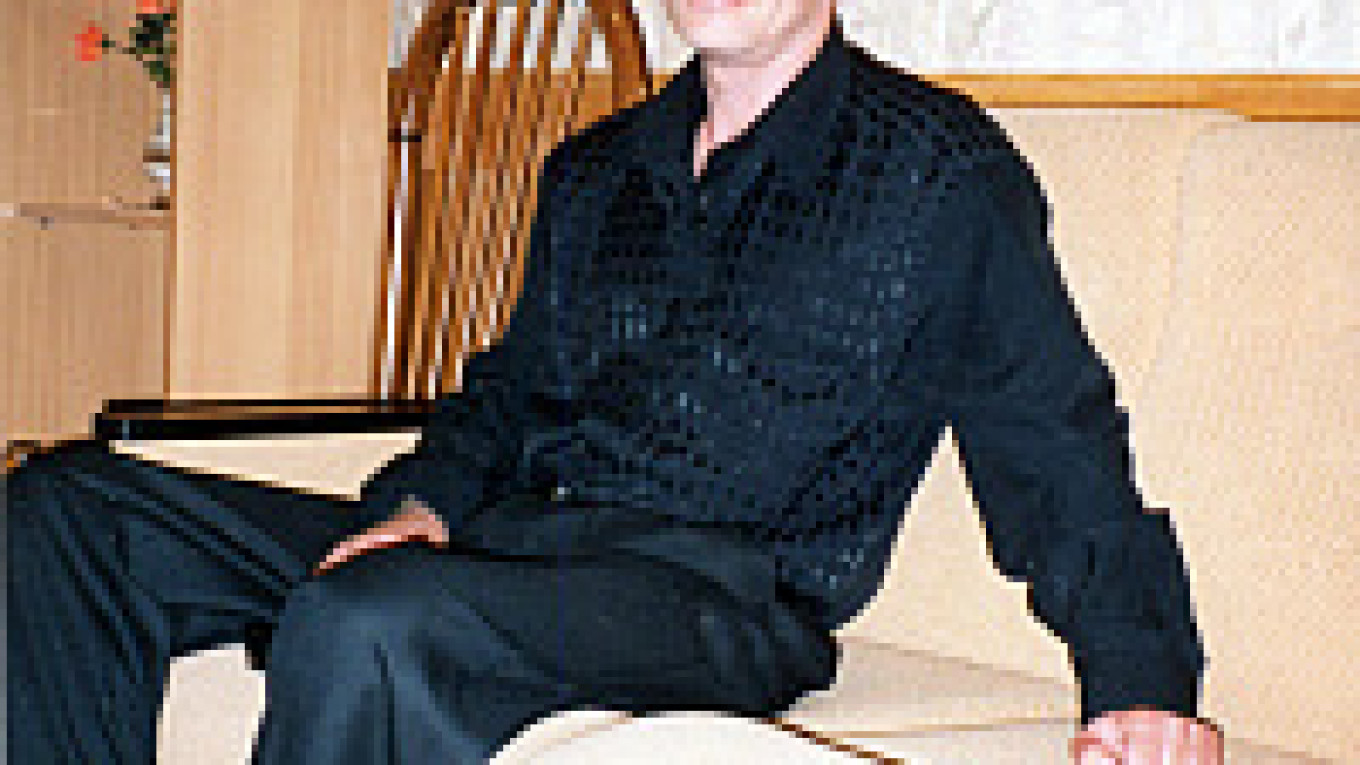Although its official name is Equal to Equal, members refer to it simply as "the club." It began four years ago as a marriage agency for people with HIV. "The main objective was to bring HIV-positive people together and marry them," said director Vyacheslav Tsunik during an interview last summer. "People look at you differently if you are married."
Now, it functions more as a support group for HIV-positives. But even so, its matchmaking effect has resulted in numerous marriages -- "nowadays, more than we can count," Tsunik said.
Tsunik, who contracted HIV eight years ago, met his fiance through the club in 2004. "I am going to marry soon," he said. "And I advise everyone who puts a cross on himself and gives up on himself as hopeless to take this cross off and do the same. Everything is not so terrible as it seems at the beginning."
For many members, the beginning was the hardest part. Marina, now 34, couldn't think of anything except her disease after learning that she was HIV-positive. "I slept brokenly all night," she recalled. "I woke up with the word 'AIDS' like hammers in my head."
Like most other members of Equal to Equal who were interviewed for this story, Marina declined to give her last name because she did not want her friends and family to know about her HIV-positive status.
When Marina's boyfriend died of AIDS in 2004, leaving her with two children and HIV, she abandoned any hope of a personal life. "I did not even dream about love or marriage," she said. "But the club changed this. The club helped me find understanding, friends, support -- and even my beloved."
She was referring to Igor, a soft-spoken 28 year old who sat next to her on a couch as they told their story. Marina and Igor still attend meetings of Equal to Equal because they hope to show others that life goes on for people who are HIV-positive.
"When the diagnosis is given, love becomes something different than before," Igor observed. "It becomes something more profound."
Many people in the club felt that their ability to lead a normal life -- and to date and marry -- was torn away from them when they were diagnosed with HIV. For many, the best solace from this isolation can be found with someone who is also HIV-positive.
The isolation is compounded by social stigmatization and the rampant proliferation of myths about AIDS. Although Russia has one of the highest growth rates of HIV infection in the world, education about the disease hasn't kept up the same pace. In some places, AIDS is still believed to be spread by bedbugs and mosquitoes.
It is for this reason that Oleg, 41, advises his HIV-positive friends to have relationships with others who are HIV-positive too, even though he himself is engaged to an HIV-negative woman.
"It is easier because both partners understand each other more profoundly, in a way that an HIV-positive and an HIV-negative person cannot," he said. "Before my fiancee, I only dated HIV-positive women, and I could not build a relationship with them or think of marriage."
Oleg said discrimination against people with HIV was common in Russia. He has had to change his job and his residence several times because of his diagnosis. In the last place he lived, people refused to shake his hand.
"It is hard to live when people whisper behind your back," he said.
Fearing discrimination, many members of the club do not disclose their HIV-positive status to friends, coworkers or even family members. "This disease always seemed to exist on another continent, in another world," said Dima, who, at 22, is the club's youngest member. "When you find out you are HIV-positive, you feel as if the whole world has fallen."
Dima dated HIV-negative girls after receiving his diagnosis, but he always broke it off because he couldn't find the words to tell them about his disease. "When I dated HIV-negative people, I could never forget the thought that I was HIV-positive," he said. "This thought was always there."
Last summer, though, he met his girlfriend, Olesya, 24, at the club. The two don't seem overly preoccupied with the fact that they are both HIV-positive -- instead, the more important thing for them is that they've found each other.
"I only have six or seven years to live," Dima said. "I understand that after that, I will die."
It sounds dramatic, but it's true -- and Dima and Olesya have learned to face such things together. Along with the rest of the club, they're living proof that life doesn't end with HIV.
A Message from The Moscow Times:
Dear readers,
We are facing unprecedented challenges. Russia's Prosecutor General's Office has designated The Moscow Times as an "undesirable" organization, criminalizing our work and putting our staff at risk of prosecution. This follows our earlier unjust labeling as a "foreign agent."
These actions are direct attempts to silence independent journalism in Russia. The authorities claim our work "discredits the decisions of the Russian leadership." We see things differently: we strive to provide accurate, unbiased reporting on Russia.
We, the journalists of The Moscow Times, refuse to be silenced. But to continue our work, we need your help.
Your support, no matter how small, makes a world of difference. If you can, please support us monthly starting from just $2. It's quick to set up, and every contribution makes a significant impact.
By supporting The Moscow Times, you're defending open, independent journalism in the face of repression. Thank you for standing with us.
Remind me later.


